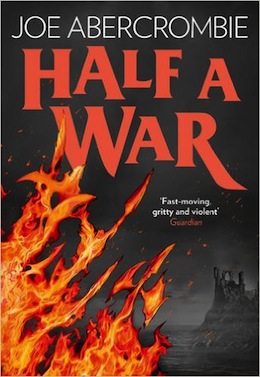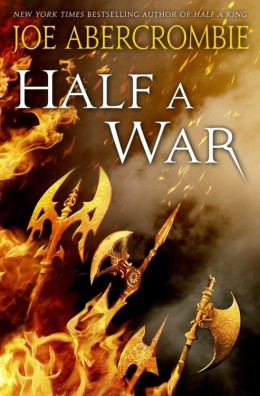Joe Abercrombie returns to the Shattered Sea series with the final volume—Half a War. Like previous volumes, Half a King and Half the World, the novel follows characters on the cusp of adulthood, learning to bear responsibility in situations that would destroy the emotional well being of even the staunchest veterans.
Half a War not only continues on in the footsteps of its predecessors, but fulfills all the series’ promises in a way that rends the soul as compulsively as anything Abercrombie has written to date.
When last we left our “heroes” of the Shattered Sea, a tenuous alliance of Gettland, Vansterland, and Throvenland had risen up against the High King and his minister, Grandmother Wexen. Many of the old gang—Thorn Bathu and Brand, Rolf and Koll—return, some in lesser roles, some in greater. Koll in particularly steps to the forefront as apprentice to Father Yarvi, while Brand fades more into the background, as Thorn’s husband. Father Yarvi remains front and center, but does not return to Abercrombie’s point of view stable.
Half a War begins when the King of Throvenland is murdered and his country is conquered, leaving his teenaged granddaughter, Skara, on the run. As Half a King is Yarvi’s book, and Half the World is Thorn’s, Skara takes center stage in the final volume. She must unite a wavering alliance between Gettland and Vansterland, while coming to grips with being a Queen and, thus, the deciding vote in Father Yarvi’s endless schemes.
It’s this concept, of a young person moving from adolescence into adulthood, which has permeated every book in the series. It has led some to classify the series as “young adult.” Even the author himself has dabbled with the idea. There’s no question Abercrombie uses the crucible of tragedy to cut his characters off from parental guidance early on and force them to make decisions for themselves. These are classic young adult tropes. But, they are also marked tropes of epic fantasy. Jared Shurin of Pornokitsch recently wrote about “the Venn Diagram of YA and Epic Fantasy—you know, that diagram that looks suspiciously like a single circle?”
He’s right.
In the way that all bananas are plantains, there is something to be said for all epic fantasy being young adult. The problem comes when not all plantains are bananas, just as not all young adult is epic fantasy. Much of what is considered young adult today is very much not epic fantasy, instead fixating on intensely personal first person points of view and dystopian milieus. In this modern sense, any attempts to call Abercrombie’s work “young adult” are specious at best. For while Joe Abercrombie continues to be as brilliant a writer as there is in the fantasy field, the expectation that the Shattered Sea Trilogy would be a departure from the darkly funny and deeply upsetting stories of his past falls hopelessly flat.
 Half a War, much like Half the World or Half a King, is intrinsically Abercrombie, eschewing any efforts to be something else. It is no more young adult than Branderson Sanderson or Brent Weeks and no less adult than Mark Lawrence or Kameron Hurley. Lacking only the occasionally morose and explicit sex scenes of previous Abercrombie novels, the issues tackled by Yarvi and Skara and Thorn are no less mature because they are happening to young people, and not men and women in their forties like Logen Ninefingers and Monza Murcatto.
Half a War, much like Half the World or Half a King, is intrinsically Abercrombie, eschewing any efforts to be something else. It is no more young adult than Branderson Sanderson or Brent Weeks and no less adult than Mark Lawrence or Kameron Hurley. Lacking only the occasionally morose and explicit sex scenes of previous Abercrombie novels, the issues tackled by Yarvi and Skara and Thorn are no less mature because they are happening to young people, and not men and women in their forties like Logen Ninefingers and Monza Murcatto.
That said, there are choices made throughout the Shattered Sea Trilogy that differentiate it from Abercrombie’s previous works. Where most of his work is about bad people trying to be good and failing, this new series is about good people trying to do bad things and succeeding. This is most apparent in Half a War, where Yarvi, and Thorn, and Skara, all must confront the idea that to accomplish their goals they must do horrible things. They must be willing to go to any lengths to win. They all want to do good, but become single minded about their idea of goodness. Where past Abercrombie mainstays like Logen and Shivers compromise too much, Yarvi and Thorn will compromise not at all. And, in conclusion, Abercrombie seems to say that while the means may differ, the ends do not.
Half a War as the final novel in the trilogy begs a reviewer not only to examine it on its own merits, but to put the entire series into context. How well does this book accomplish its goal as a novel? And, how well does it accomplish the promise set out in the first volume? Half a War is a success in every way, putting a stupendous capstone on the entire Shattered Sea Trilogy.
There has been little said here about the story in Half a War, or even the overarching plot of the entire series. There’s a reason for that. Unlike many purveyors of epics, Abercrombie’s books are never about what happens, but how what happens impacts the lives of the men and women who experience them. He is a writer of character, a master at bringing to life these strange and entirely fictitious individuals. Nothing in the novel distracts from this, not a magic system, not a pantheon, not even the plot itself. The result is a delightfully rich experience, in which the reader falls hopelessly in love with a bunch of people they would cross the street to avoid.
If anyone was wondering whether Abercrombie would succeed writing something new, there is no longer any doubt. Can he write “young adult”? Perhaps not in the modern sense. But, if viewed through a lens where Tamora Pierce and David Eddings are icons of the form, the Shattered Sea Trilogy is that same idea brought forward thirty years. And, as all of our media has become increasingly mature, even that intended for young people, so too has this concept of coming-of-age epic fantasy. There is no right reader for the Shattered Sea Trilogy, nor is there a wrong one. It a fantasy for all ages, and all times, so long as you’re emotionally prepared to have your heart ripped out. Because, despite the titles of his novels, Joe Abecrombie isn’t one for half-measures.
Half a War is available now from Del Rey (US) and HarperVoyager (UK).
Justin Landon used to run Staffer’s Book Review. Now he kinda blogs at justlandon.com. Find him on Twitterfor meanderings on science fiction and fantasy, and to argue with him about whatever you just read.










